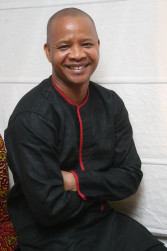
Every week I feature one photograph and the photographer who took it. You’ll read a short introductory note from me, and more importantly, a statement from the photographer.

Every week I feature one photograph and the photographer who took it. You’ll read a short introductory note from me, and more importantly, a statement from the photographer.

A writer clears his path through incessant questioning—seeking more than anything else an honest evaluation of his position and place in the subject’s affairs. Devoid of any irrelevancy and unpretentiousness, a piece of writing will consequently function as honest, and as intimate. Hence there is a sense in which “intimacy” means “clarity.”

Emmanuel Iduma is a writer of fiction and non-fiction. Born and raised in Nigeria, he has contributed essays and stories to journals, magazines (Africanah.org among others), artists’ books, and exhibition catalogues. In 2017, he was associate curator of the Nigerian pavilion at the Venice Biennale.
He is the author, most recently, of A Stranger’s Pose. He also published the novel The Sound of Things to Come and Gambit: Newer African Writing.His writing style could be characterized as literary and personal non-fiction.
This article was first published on Africanah.org December 6, 2016.

“It’s possible that a novelist begins a novel in an attempt to open up a photograph, or several photographs. I will like to write such a novel. It’s this sort of future I wish to imagine for photographs—a world in which they are bound up with novels.”

Victor Ehikhamenor grew up seeing symbolic paintings and drawings on shrine-walls in the village of his birth. Upon maturity, after he received a drawing book for school, he began to imitate the wall drawings on paper. Four decades later, some of those walls have crumbled; the artist retains, however, a copy of that drawing book. He carries it in his memory.